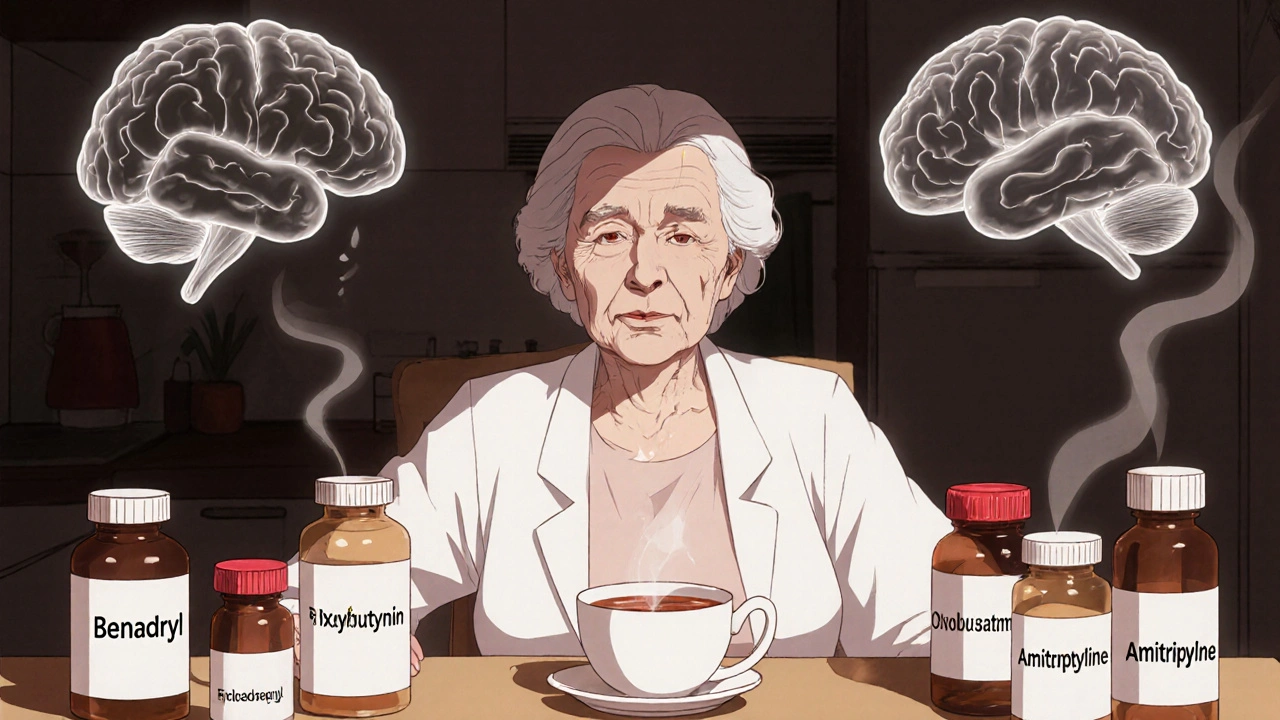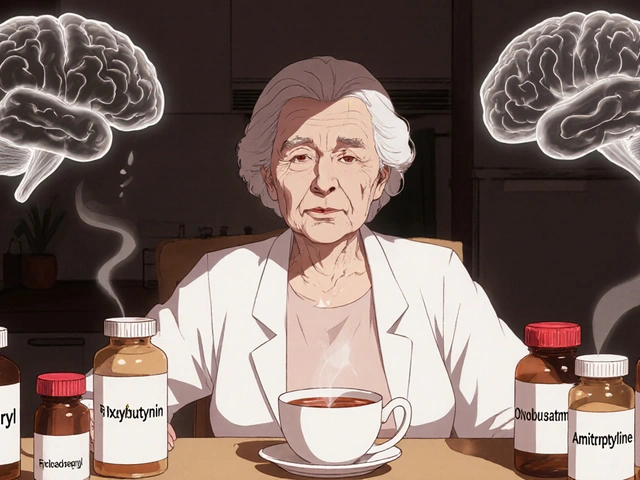Every year, millions of older adults take medications for overactive bladder, allergies, depression, or Parkinson’s. Many of these drugs work by blocking a brain chemical called acetylcholine. These are called anticholinergics. They help with symptoms-but they also quietly damage memory and leave your mouth dry every single day. And most people don’t realize it until it’s too late.
What Anticholinergics Do to Your Brain
Acetylcholine isn’t just some background chemical. It’s essential for memory, focus, and learning. When anticholinergics block it, your brain struggles to form new memories or recall old ones. The effect isn’t subtle. People on these drugs perform 23-32% worse on memory tests. Their executive function-planning, decision-making, problem-solving-drops by 18-27%. This isn’t just "getting older." This is measurable brain change. Brain scans show the damage. People taking high-ACB (Anticholinergic Cognitive Burden) drugs lose 0.5-1.2% more brain volume each year than those who don’t. The hippocampus, the brain’s memory center, shows 8-14% less glucose use-meaning it’s not getting the energy it needs. Ventricles, the fluid-filled spaces in the brain, grow 10-15% larger. These are the same changes seen in early Alzheimer’s. The risk isn’t just theoretical. A 2015 study of 48,000 people found that using anticholinergics for three or more years doubles the risk of dementia. In a 2016 study of 451 older adults, 63% of those on high-ACB drugs developed mild cognitive impairment or Alzheimer’s within 10 years. That’s more than double the rate of non-users.Not All Anticholinergics Are the Same
You might think all these drugs are equally risky. They’re not. The Anticholinergic Cognitive Burden (ACB) scale rates them from 0 (no effect) to 3 (high risk). A score of 2 or 3 means serious brain impact.- High risk (ACB 3): Diphenhydramine (Benadryl), oxybutynin, scopolamine, amitriptyline
- Moderate risk (ACB 2): Tolterodine (sometimes), fesoterodine
- Low or no risk (ACB 1 or 0): Glycopyrrolate, trospium, darifenacin, tiotropium, mirabegron
Dry Mouth: The Constant, Annoying Side Effect
If you’re on an anticholinergic, you probably know this one: dry mouth. It’s not just uncomfortable. It’s a sign your body is being robbed of something vital. Saliva isn’t just for talking or swallowing. It protects teeth, prevents infections, and helps digest food. Eighty-two percent of users on Drugs.com report dry mouth as their top complaint. People describe needing 2-3 liters of water daily. Some say they can’t speak clearly. Others wake up with cracked lips and sore throats. It’s not just a nuisance-it’s a health hazard. Dry mouth increases the risk of cavities, gum disease, and oral infections. And for older adults, swallowing problems can lead to pneumonia. The good news? There are ways to manage it. Sugar-free gum or lozenges can boost saliva by 30-40%. Prescription saliva substitutes like Xerolube help but cost $25-40 a month. Pilocarpine, a medication that stimulates saliva glands, increases flow by 50-70%-but it can cause sweating, nausea, or blurry vision. It’s not perfect, but it’s better than living with constant thirst.
Who’s at Risk-and Who Should Stop
The American Geriatrics Society says this clearly: avoid anticholinergics in people over 65. They’ve listed 56 drugs as potentially inappropriate for older adults. That includes diphenhydramine (Benadryl), oxybutynin, and amitriptyline. These aren’t rare drugs. They’re in medicine cabinets everywhere. But stopping isn’t always easy. If you’re on an anticholinergic for Parkinson’s, suddenly quitting can cause tremors, stiffness, or even psychosis. The same goes for severe depression or chronic pain. The risk isn’t just about the drug-it’s about what replaces it. That’s why the European Geriatric Medicine Society recommends a slow, supervised plan: use the lowest dose possible, for the shortest time. Monitor cognition every six months with a MoCA test. Ask your doctor: Is this drug still necessary? Is there a safer alternative?What You Can Do Right Now
If you or a loved one is on one of these drugs, here’s what to do:- Check the ACB score. Search "ACB scale [drug name]"-many are listed online.
- Ask your doctor: "Is this medication still needed? Are there non-anticholinergic options?"
- For overactive bladder: Ask about mirabegron or pelvic floor therapy.
- For allergies: Try a nasal spray like fluticasone instead of oral antihistamines.
- For depression: SSRIs like sertraline or citalopram have no anticholinergic effect.
- For sleep: Avoid diphenhydramine. Try melatonin or cognitive behavioral therapy for insomnia.

The Bigger Picture
Despite the risks, the global anticholinergic market hit $8.7 billion in 2023. Why? Because these drugs work. They stop bladder spasms. They reduce tremors. They calm anxiety. But we’ve been ignoring the cost. Newer drugs are changing the game. Trospium chloride XR has 70% less brain penetration than oxybutynin. Xanomeline, a new drug for Alzheimer’s psychosis, causes far less dry mouth. AI tools like MedAware are now being used to flag risky prescriptions before they’re written. The FDA updated labels in 2022 to warn about cognitive risks. The UK’s NICE now recommends deprescribing anticholinergics in 68% of long-term users over 65. Prescriptions for high-risk anticholinergics have dropped 22% since 2015. Mirabegron use has tripled. Progress is slow-but it’s happening.Final Thought
Medications aren’t good or bad. They’re tools. But some tools wear out the things they’re meant to fix. Anticholinergics relieve symptoms-but they also accelerate brain aging. Dry mouth is the small price you pay for bigger damage. If you’re taking one of these drugs, you deserve to know the full cost. And if you’re not sure? Ask your doctor. Your memory-and your saliva-will thank you.Can anticholinergics cause dementia?
Yes, long-term use of high-ACB anticholinergics (like oxybutynin, diphenhydramine, or amitriptyline) is linked to a doubled risk of dementia after three or more years of use. Brain imaging shows these drugs cause measurable shrinkage in memory centers, reduced brain activity, and larger fluid-filled spaces-changes also seen in early Alzheimer’s. The risk is dose-dependent: the higher the ACB score and the longer the use, the greater the damage.
Is oxybutynin safe for older adults?
No, oxybutynin is not recommended for older adults due to its high anticholinergic burden (ACB 2-3). It’s one of the most common causes of memory problems in seniors on multiple medications. The American Geriatrics Society and NICE both advise avoiding it in patients over 65. Safer alternatives like mirabegron (a beta-3 agonist) or behavioral therapy offer similar bladder control without cognitive risks.
What are the best alternatives to anticholinergics for overactive bladder?
For overactive bladder, mirabegron (Myrbetriq) is the top non-anticholinergic option-it works just as well as oxybutynin but doesn’t affect memory or cause dry mouth. Pelvic floor physical therapy, bladder training, and timed voiding are also highly effective and carry no drug risks. For those who need medication, trospium or darifenacin have lower ACB scores and less brain penetration than oxybutynin.
How can I tell if my dry mouth is from medication?
If your dry mouth started after beginning a new medication-and you’re taking something like Benadryl, oxybutynin, amitriptyline, or an antihistamine-it’s very likely caused by the drug. Anticholinergics reduce saliva production by blocking acetylcholine. Other signs include difficulty swallowing dry food, frequent thirst, cracked lips, or bad breath. If you’re on multiple medications, check their ACB scores. Even one high-ACB drug can cause this.
Can the brain recover after stopping anticholinergics?
Some cognitive improvement is possible after stopping, especially if the drug was taken for less than a year. Memory and attention may bounce back within months. But long-term users (3+ years) may not fully recover, especially if brain atrophy has already occurred. The earlier you stop, the better the chance of recovery. Stopping doesn’t reverse structural damage, but it stops further decline-and gives your brain a chance to heal what it can.
Are there any anticholinergics that are safe for long-term use?
No anticholinergic is truly safe for long-term use in older adults. Even low-ACB drugs (score 1) like glycopyrrolate or tiotropium can contribute to cumulative brain effects over time. The safest approach is to avoid them entirely if possible. For conditions like asthma or COPD, inhalers like ipratropium have minimal systemic absorption, making them lower risk than oral versions. But for chronic conditions like bladder issues or depression, non-anticholinergic options are always preferable.




i had no idea benadryl was this bad for your brain. i’ve been taking it for sleep for years… guess i’m switching to melatonin. thanks for the wake-up call.
Classic. Pharma pushes cheap, toxic drugs because profits > people. Oxybutynin? More like oxy-dementia.
bro i was on this stuff for 5 years and my memory felt like swiss cheese. my mom didn’t even recognize me once. don’t be that guy.
so many people in india take diphenhydramine for colds and sleep. we need to spread awareness here too. this is serious stuff. your brain matters more than a quick fix.
the ACB scale is underutilized in clinical practice. clinicians need better decision support tools to flag high-risk polypharmacy regimens in geriatric populations.
YOU’RE KILLING YOUR BRAIN WITH BENADRYL?? 😱 STOP IT NOW. I’ve seen dementia in my grandma-don’t let it be yours. #WakeUp
They don’t tell you this because the drug companies own the FDA. You think this is an accident? No. It’s profit-driven negligence.
my grandma switched from oxybutynin to mirabegron and her dry mouth disappeared. she’s laughing again. small changes matter.
It is an egregious dereliction of medical ethics to permit the widespread prescription of anticholinergic agents with such demonstrable neurotoxic potential. The regulatory apparatus has failed the elderly with abject negligence.
my dad’s on mirabegron now and he says he feels like his brain came back. also no more 3am water runs 😅
Let me be clear: anticholinergics are not benign. They are not harmless. They are not safe for long-term use. And yet, they are prescribed with alarming frequency. This is not a debate. This is a crisis.
Most people don’t even know what acetylcholine is. They just want their bladder to stop acting up. That’s why this problem persists.
Just because a drug is cheap doesn’t mean it’s worth it. I’ve seen patients lose 10 years of memory over a $15 pill. That’s not a bargain.
Thank you for sharing this. I printed out the ACB list and gave it to my mom’s doctor. She’s switching off amitriptyline next week. 🙏
i started asking my dr about alternatives after reading this and she didn’t even know the acb scale. we’re all just winging it. let’s do better.